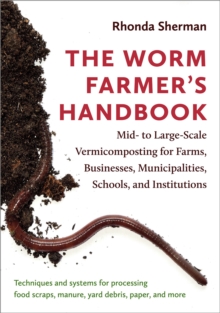Description
| Product ID: | 9781603587792 |
| Product Form: | Paperback / softback |
| Country of Manufacture: | US |
| Title: | The Worm Farmer’s Handbook |
| Subtitle: | Mid- to Large-Scale Vermicomposting for Farms, Businesses, Municipalities, Schools, and Institutions |
| Authors: | Author: Rhonda Sherman |
| Page Count: | 256 |
| Subjects: | Sedimentology and pedology, Soil science, sedimentology, Agricultural science, Sustainable agriculture, Self-sufficiency and ‘green’ lifestyle, Wildlife: butterflies, other insects and spiders: general interest, Agricultural science, Sustainable agriculture, Green lifestyle & self-sufficiency, Wildlife: butterflies, other insects & spiders |
| Description: | Select Guide Rating Choice Reviews, Outstanding Academic TitleTechniques and systems for processing food scraps, manure, yard debris, paper, and moreTurning waste into wealth sounds too good to be true, but many worm farmers are finding that vermicomposting is a reliable way to do just that. Vermicast—a biologically active, nutrient-rich mix of earthworm castings and decomposed organic matter—sells for $400 or more per cubic yard. Compare that to regular compost, sold at about $30 a cubic yard, and you’ll see why vermicomposting has taken root in most countries and on every continent but Antarctica. Vermicomposting is also one of the best sustainable solutions for organic waste management. Vermicomposting manure and crop wastes on farms improves crop yields while reducing demand for off-farm inputs. Vermicast has higher nutrient levels and lower soluble salt content than regular compost, and it improves soil aeration, porosity, and water retention. Plus, vermicast suppresses plant diseases and insect attacks. Municipalities, businesses, community gardens, schools, and universities can set up vermicomposting operations to process food residuals and other waste materials. The Worm Farmer’s Handbook details the ins and outs of vermicomposting for mid- to large-scale operations, including how to recycle organic materials ranging from food wastes and yard trimmings to manure and shredded office paper. Vermicomposting expert Rhonda Sherman shares what she has learned over twenty-five years working with commercial worm growers and researchers around the world. Her profiles of successful worm growers across the United States and from New Zealand to the Middle East and Europe describe their proven methods and systems. This book digs into all the details, including:Choosing the right production systemRegulatory issues and developing a business and marketing planFinding and managing feedstocksPre-composting: why and how to do itMonitoring an active worm bedHarvesting, screening, testing, packaging, and storing vermicastMarkets for earthworms and vermicastFood security: how vermicast benefits soils and plantsKeys to success: avoiding common pitfallsFrom livestock farms and restaurants to colleges, military bases, and prisons, Sherman details why and how commercial-scale vermicomposting is a fast-growing, sustainable solution for organic waste management. The Worm Farmer’s Handbook is the first and only authoritative how-to guide that goes beyond small-scale operations and demystifies the science and logistics of the fascinating process that is vermicomposting. Choice Reviews, Outstanding Academic Title Techniques and systems for processing food scraps, manure, yard debris, paper, and more Turning waste into wealth sounds too good to be true, but many worm farmers are finding that vermicomposting is a reliable way to do just that. Vermicast—a biologically active, nutrient-rich mix of earthworm castings and decomposed organic matter—sells for $400 or more per cubic yard. Compare that to regular compost, sold at about $30 a cubic yard, and you’ll see why vermicomposting has taken root in most countries and on every continent but Antarctica. Vermicomposting is also one of the best sustainable solutions for organic waste management. Vermicomposting manure and crop wastes on farms improves crop yields while reducing demand for off-farm inputs. Vermicast has higher nutrient levels and lower soluble salt content than regular compost, and it improves soil aeration, porosity, and water retention. Plus, vermicast suppresses plant diseases and insect attacks. Municipalities, businesses, community gardens, schools, and universities can set up vermicomposting operations to process food residuals and other waste materials. The Worm Farmer’s Handbook details the ins and outs of vermicomposting for mid- to large-scale operations, including how to recycle organic materials ranging from food wastes and yard trimmings to manure and shredded office paper. Vermicomposting expert Rhonda Sherman shares what she has learned over twenty-five years working with commercial worm growers and researchers around the world. Her profiles of successful worm growers across the United States and from New Zealand to the Middle East and Europe describe their proven methods and systems. This book digs into all the details, including:
From livestock farms and restaurants to colleges, military bases, and prisons, Sherman details why and how commercial-scale vermicomposting is a fast-growing, sustainable solution for organic waste management. The Worm Farmer’s Handbook is the first and only authoritative how-to guide that goes beyond small-scale operations and demystifies the science and logistics of the fascinating process that is vermicomposting. |
| Imprint Name: | Chelsea Green Publishing Co |
| Publisher Name: | Chelsea Green Publishing Co |
| Country of Publication: | GB |
| Publishing Date: | 2018-11-09 |


